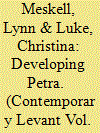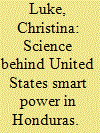| Srl | Item |
| 1 |
ID:
183190


|
|
|
|
|
| Summary/Abstract |
This article charts the nascent development agendas for archaeological heritage and tourism at Petra in Jordan. We begin with the early internationalism of UNESCO and its participation programme for Petra followed by the restructuring of American foreign policy interests to embed heritage tourism within USAID projects. A technocratic tourism-as-assistance model galvanised USAID and the World Bank’s interest in Petra, as it did the CIA, the American Schools of Oriental Research, the US National Park Service, and Jordan’s Department of Antiquities. Thus, we reveal how saving Petra was underwritten by an increasing American vigilance in the Middle East. Unlike the educational and humanitarian components of the United Nations programme, the USAID and World Bank initiatives at Petra were almost exclusively directed toward tourism development, generating hard-currency revenue, monetising the Nabataean ruins, and sowing the seeds of predatory capitalism. Our longitudinal study reveals that what has been sustained at Petra is not the preservation of heritage, nor support for local communities, but rather an overburden of international bureaucracy and consultancy culture.
|
|
|
|
|
|
|
|
|
|
|
|
|
|
|
|
| 2 |
ID:
111569


|
|
|
|
|
| Publication |
2012.
|
| Summary/Abstract |
The cultural heritage of Honduras offers a critical platform for United States heritage diplomacy under the United States Department of State, Bureau of Educational and Cultural Affairs, Cultural Heritage Center. Of specific note is the formal 2004 Honduran-American Memorandum of Understanding for the preservation of cultural property and, beginning in 2001, periodic projects under the Ambassadors Fund for Cultural Preservation. The diplomatic efficacy of American cultural heritage policy and the Ambassadors Fund comes from long-term, sustained funding from the National Science Foundation, the National Endowment for the Humanities, and the Fulbright Program. Established networks by archaeologists have enabled the successful re-entry of United States cultural diplomacy in Honduras in the last decade.
|
|
|
|
|
|
|
|
|
|
|
|
|
|
|
|